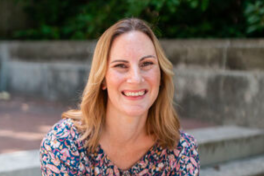Associate Professor Emily Moyer-Gusé researches “narrative persuasion,” specifically how entertainment media can influence beliefs and attitudes across an array of controversial topics.

“Narratives, or stories, are sometimes more effective than a more explicit persuasive appeal,” Moyer-Gusé said. “They’re able to reduce resistance to the message, making people less likely to be defensive or to generate a counterargument because of the way we get swept up into the story of somebody else's lived experience.”
The end goal of this research for Moyer-Gusé is to understand how to use engaging television shows and stories to encourage people to be more open to talking about topics such as end-of-life issues and safer sex behaviors.
Moyer-Gusé has always been interested in persuasion. Her undergraduate degree in advertising allowed her to gain more knowledge on the psychology behind influencing someone's behavior or convincing them to do one thing or another. Moyer-Gusé has conducted several studies on children’s emotional reactions to news and entertainment programming as well as parent strategies to alleviate children's news-induced fears.
“I want to understand the specific circumstances under which stories might be a more effective way to persuade audiences, because if we can understand that, conceptually and theoretically, then message designers can apply that across all different kinds of topics,” Moyer-Gusé said.
Moyer-Gusé has been at Ohio State for 16 years. She incorporates her research with her teaching interests, teaching courses on media effects like the undergraduate course Advertising and Society. Moyer-Gusé enjoys teaching undergraduate students because they help keep her current on changes in the media landscape, which helps advance her research.
Moyer-Gusé’s research has been published in journals such as Media Psychology, Journal of Health Communication, Journal of Media Psychology, Mass Communication & Society and Communication Studies. She presents her research regularly at both the International Communication Association and the National Communication Association.
Moyer-Gusé received her bachelor's degree in advertising and master's degree in communication from Michigan State University. She earned her PhD in communication from the University of California Santa Barbara.
“I want to be able to understand this well enough that message designers, health practitioners, parents, or whatever the relevant interest group is, can use this information to figure out the best way to develop a message that’s going to have the impact they want it to have on various health or social issues,” Moyer-Gusé said.
Article by student Ella Gomez
